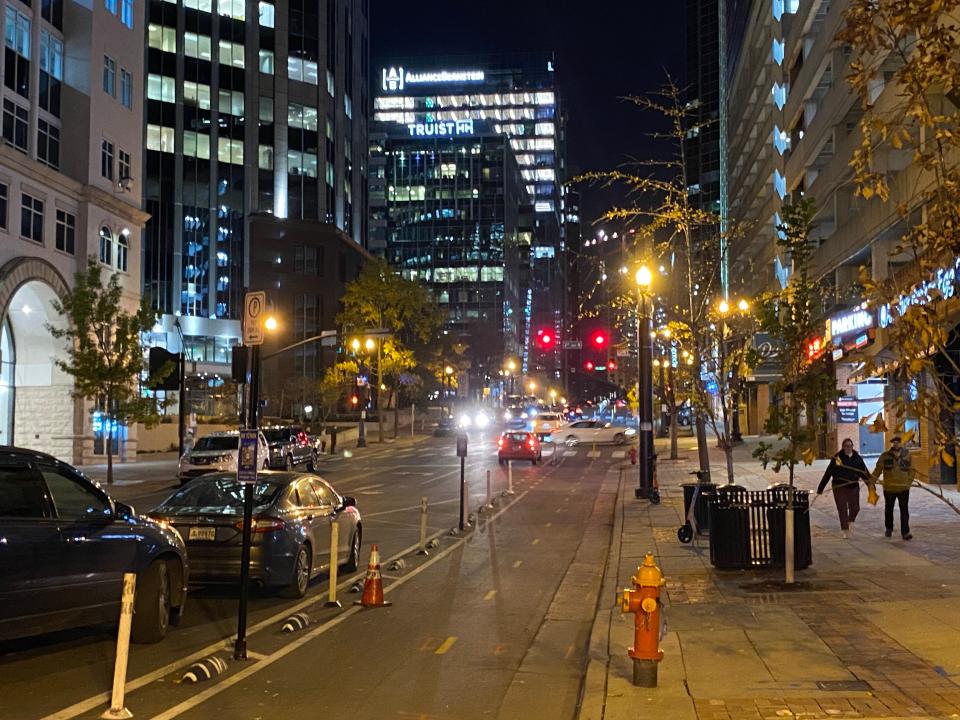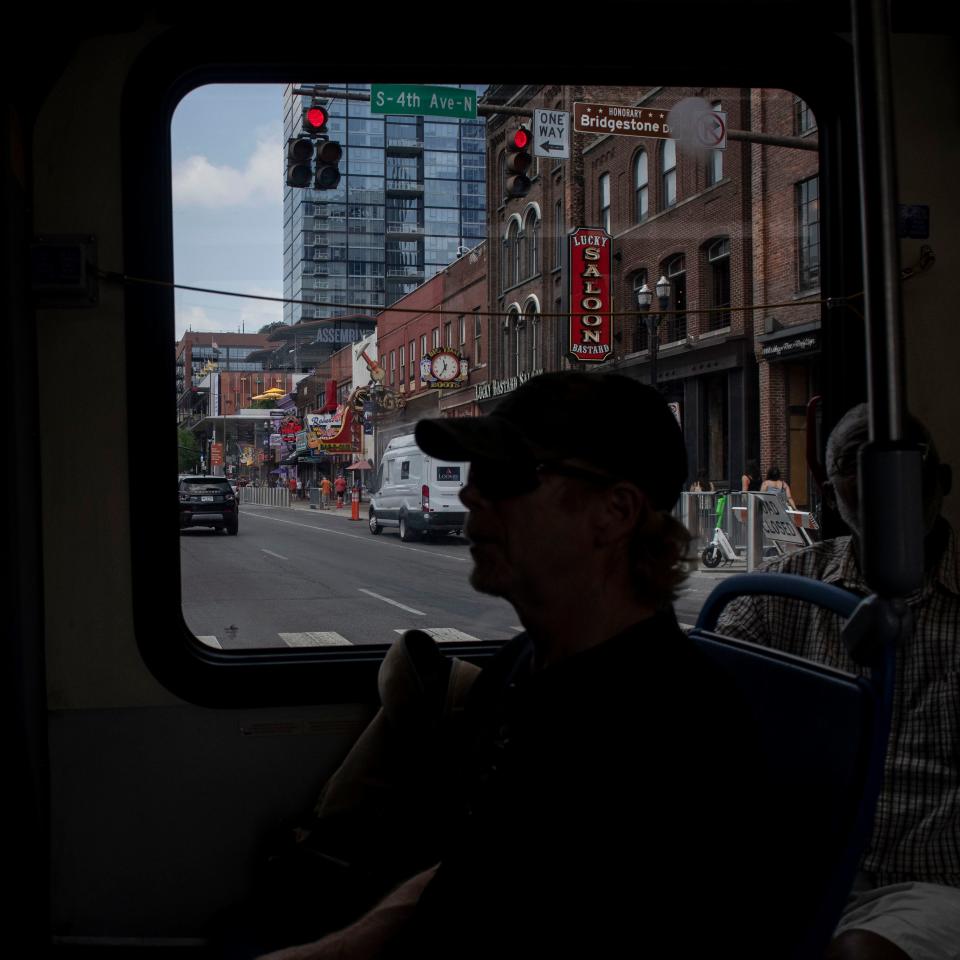How Nashville wants to solve its downtown traffic problem
A long-awaited plan to make it easier to travel through Nashville's downtown is now live, and accepting public feedback.
ConnectDowntown is a 10-year action plan for traffic and transportation improvement in Nashville's urban core, developed across two years of study and engagement. The plan is currently in draft form, with plans to release its final version in early 2024.
The report states car and bus trips downtown are "wildly unpredictable" thanks to construction, special events and congestion. But though just 20% of people surveyed for the study said they prefer to drive downtown, 80% of commuters in the Nashville area drive alone. There simply aren't many other workable options available.
The result: a commute that lands Nashville-area drivers in about 80 hours of traffic per year.
Forbes recently ranked Nashville as the city with the worst commute, in part citing the city's low walkability, mass transit and bike scores.
Marty Sewell, the transportation planning director for Nashville's Department of Transportation, said the downtown bus system, and pedestrian and other mobility improvements posited in the action plan could help alleviate traffic woes beyond the urban core.
"It would be transformative for our transit network to have this type of investment downtown," Sewell said during a presentation at the Civic Design Center Wednesday. "It sounds like a downtown improvement, but in reality this is a regional transit improvement, a regional transit investment that is necessary to make anything else work."
The plan covers three phases, spanning from 2024 to 2030 and beyond.
For the 10-year timeline to stick, Nashville will have to come up with a dedicated source of funding for transit improvements, according to the report. Nashville Mayor Freddie O'Connell was recently advised to consider holding in November 2024 a voter referendum on a tax increase that would dedicate revenue to transit projects. He has not yet indicated his decision.
Here's what to know about the ConnectDowntown action plan.

Congestion
Gone would be the days of traffic cops manually controlling traffic signals during Nashville's frequent big events. With the installation of digital message signs and adaptive signals at downtown intersections, traffic engineers at Nashville's new Traffic Management Center (opening in early 2024) could adjust signals to curtail congestion in real-time.
Converting Second Avenue into a two-way street over three segments would better balance the flow of traffic, the report states. The interstate would need to be rebuilt or rearranged to make that switch come to fruition, Sewell said. A portion of Third Avenue would convert into a one-way northbound street, with Fourth Avenue becoming its one-way southbound counterpart. While the draft plan shows Seventh Avenue becoming a one-way southbound street, Sewell said this may be scrapped from the plan, as Sixth Avenue already accommodates one-way southbound traffic.
Safety for pedestrians, drivers
Changing pedestrian signals to give people a head start in crossing the street and adding curb bulbs near intersections for additional pedestrian space would improve safety for downtown's most vulnerable travelers. NDOT has allocated $14 million toward projects on downtown streets that are part of Nashville's High Injury Network — where most injuries and deaths occur — to improve safety.
Cutting down on or eliminating the ability of drivers to turn right at red lights can also improve safety for those crossing the street, the report states. Enhanced enforcement and education round out the Vision Zero action plan focused on eliminating traffic fatalities.

Streamlining transit
The report lays out a loop of "Transit Priority Corridors" that allow buses to avoid getting stuck in traffic, saving bus riders time and reducing the number of individual drivers on the road. The corridors would link the existing WeGo Central hub to new East Bank and SoBro mobility centers.
Shorter bus lane sections and "queue jump" lanes would give transit priority beyond the loop, and expanded service on seven routes leading into and out of downtown would boost ridership, the report states.
"To give you an idea of what that would look like, in real time, if you can imagine being in Nashville, stepping up to a bus stop, and there's a bus every two to three minutes … you begin to have a real frequency that people can depend on and use," Sewell said.
Filling in mobility gaps
Two-thirds of those surveyed for the ConnectDowntown study said they didn't feel safe biking downtown. The action plan would create "mobility lanes" to be used for bikes, e-bikes, scooters and more, creating a complete network from today's piecemeal "obstacle course" of bike lanes, Sewell said.
"Without a network, we have what we have now: It's all disjointed, and we're making people have to make a lot of choices that aren't … the safest possible choices with mobility," he said.
The network would connect to greenways, extending car-free mobility beyond the downtown footprint. Accessibility improvements and wider sidewalks would allow more space for pedestrians, and parking corrals for scooters and dockless bicycles would keep walkways clear.
Managing downtown's curbs
NDOT would roll out new regulations governing how and when downtown curbs can be used during certain times of day. Early morning hours would prioritize delivery loading and unloading, for example. Passenger loading and unloading, ride-hailing service pick-ups and drop-offs, and parking would be prioritized later in the day.
Specified pick-up and drop-off zones off of Broadway for ride-hailing services like Uber and Lyft could simplify the process, and other strategies like a permitting requirement or fees for trips beginning and ending during peak hours in downtown could minimize their impact.
The city's valet parking program would also receive renewed scrutiny — most restaurants, for instance, don't need a curb dedicated to valet service for 24 hours a day, Sewell said.
Nashville will consider new curb management technology to enforce curb regulations and potentially facilitate smart loading and delivery programs.
How to get involved
The full draft of the ConnectDowntown Action Plan, as well as a summary version, is available at ConnectDowntown.Nashville.gov. A feedback survey will be available at that site through Dec. 22.
This article originally appeared on Nashville Tennessean: Nashville to tackle congestion, pedestrian safety, invest in transit

